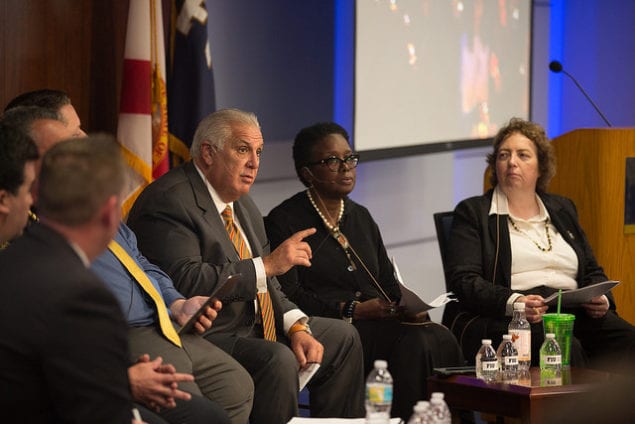The tragic mass shooting at Marjory Stoneman Douglas High School left Florida grieving. It also jumpstarted debates – both local and national — about gun violence, policy change and safety in our schools and communities.
To shed light on these topics, a group of FIU professors and practitioners recently came together for an interdisciplinary discussion, analyzing the numerous aspects intertwined with gun violence, from public policy and mental health to medicine and law enforcement.
The panel featured Alexander D. Casas, chief of police of the FIU Police Department; Ellen Cohn, associate professor in the Department of Criminal Justice; Jonathan Comer, professor of psychology in the College of Arts, Sciences and Education and director of mental health interventions & technology at the Center for Children and Families; Manuel A. Gomez, associate dean in the College of Law; Pedro “Joe” Greer, associate dean in the Herbert Wertheim College of Medicine (COM); and Valerie Patterson, associate professor in the Department of Public Policy and Administration. Brian Fonseca, the director of the Jack D. Gordon Institute for Public Policy, moderated the discussion.
Cohn shared shocking statistics.
In 2016, more than 38,000 people in the U.S. died due to gun violence, including homicides and suicides. In Florida, there were 12.6 gun-related deaths per 100,000 people that year – significantly higher than the national average of four deaths per 100,000 people.
Mass shootings account for a relatively small portion of gun deaths. But, according to a CNN report featuring a list of worst mass shootings in the country, no other states had more mass shootings than Florida, California and Texas – with each having four mass shootings.
To better understand the problem, panelists said, societies need to take many different factors into account, from analyzing how gun violence disproportionately affects minorities to avoiding the pitfalls of using mental illness as a scapegoat for gun violence.

The panel also brought up the problem with transplanting gun control models from other countries: a successful policy in one country will not necessarily succeed in another.
“There is no easy single policy fix for this issue,” Greer said. “It becomes incumbent upon us especially in an academic center to think this through with facts, with evidence and then come up with the right conclusions that we can suggest to our politicians. I think here we have the resources to [do that].”
FIU is actively engaging in ways to reduce gun violence and increase safety around campus and the community.
Through COM’s Green Family Foundation NeighborhoodHELP program, a team of FIU students and professors conduct household care visits in South Florida’s underserved communities.
If program members see a legal gun in a house during a visit, they connect the family with the FIU Police Department and Casas’ team trains the families on how to use that gun. COM’s Department of Humanities, Health and Society buys a lock for that gun to ensure firearm safety for children in the house.
FIU is also leading the way locally and nationally in terms of campus security with a behavioral intervention team made up of representatives from units across campus. The team meets every two weeks or as needed to share incidents that bring up safety concerns.
If team members know of students who have made threats, seem to fantasize about school shootings or exhibit other troubling behavior, they discuss these incidents; together, they review if the student has exhibited other symptoms of misconduct or mental health illness.
When FIU Police is made aware of concerning behavior, the team follows up with the person to determine whether he or she was issuing a threat or making inappropriate comments that were taken out of context.
Vice President of the Office of Engagement Saif Ishoof, in attendance at the event, also spoke about his office’s work in the community to curtail gun violence. Through the Together for Children program, FIU has helped convene a taskforce with representatives from areas like law enforcement, Miami-Dade Public Schools and public health to discuss youth gun violence and ways to combat it.
“Gun violence and the epidemic of mass shootings in our schools and other public places reminds us of just how vulnerable we are,” said Founding Dean of the Steven J. Green School of International and Public Affairs John F. Stack Jr. “This has been an extraordinary presentation of fact, understanding, and, I think, of hope.”
A recording of the entire discussion is available here.
Those interested in learning more about Together for Children can reach out to Caryn Lavernia in the Office of Engagement at claverni@fiu.edu.






